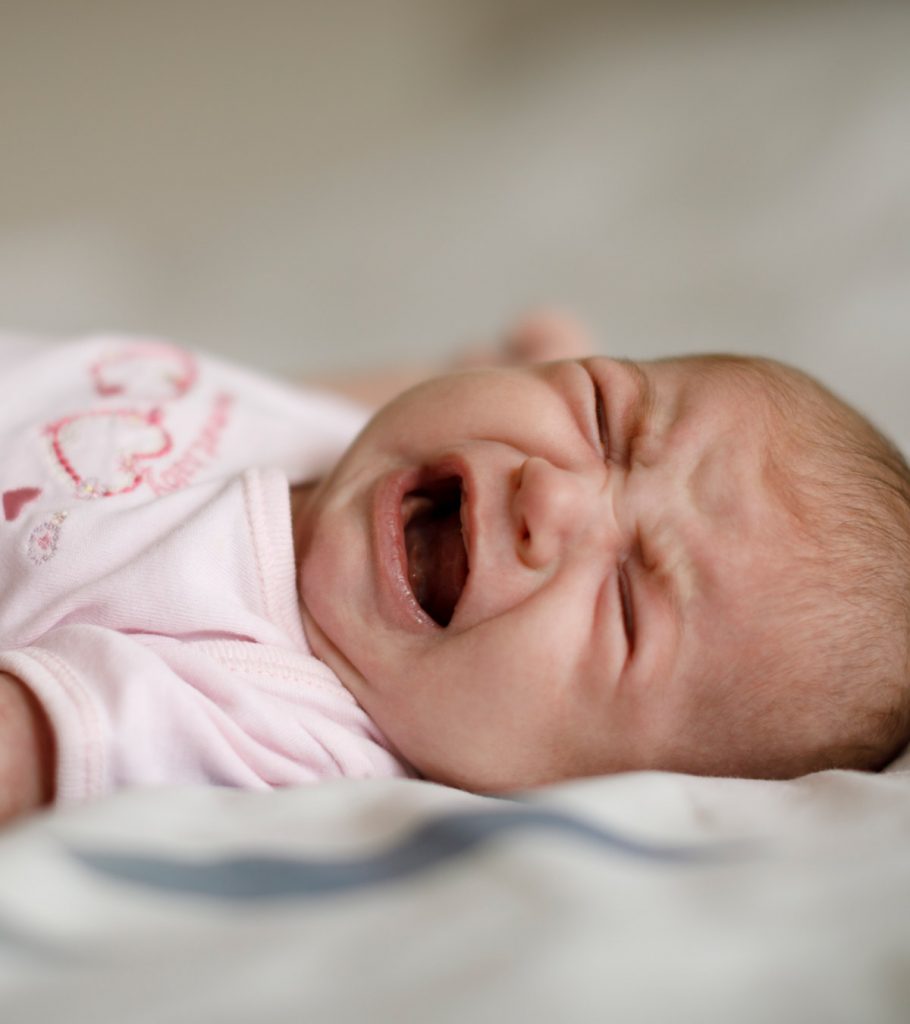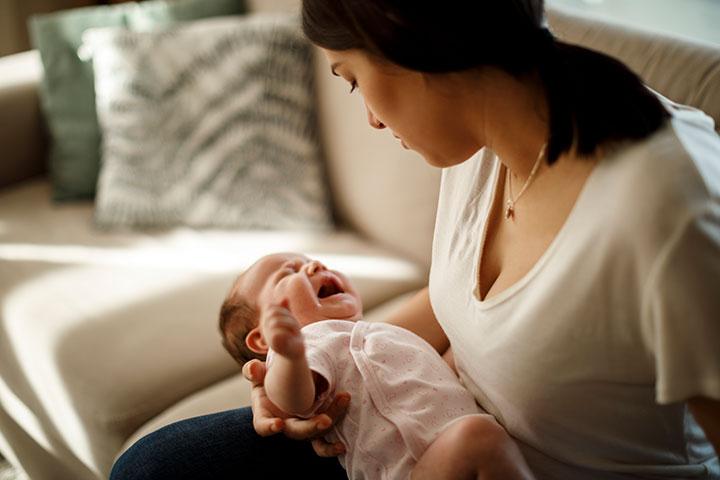Hoarse voice in babies can be due to various reasons ranging from overuse of vocal cords to viral infections. The common cold is the most common cause of hoarseness in babies. Babies who cry a lot may also experience hoarseness due to overuse of vocal cords.
Although some people may use dysphonia and hoarseness interchangeably, these are different conditions. Dysphonia involves issues with voice production, resulting in poor voice quality, affecting communications skills. In comparison, hoarseness is a rough voice (1).
Read on to know the causes, treatment, and prevention of hoarse voices in babies.
What Causes A Hoarse Voice In Babies?
Dr. Paul Patterson, a board-certified pediatrician and expert in developmental and behavioral pediatrics from Bethesda, Maryland, says, “Everyone has differences in vocal qualities, and some voices may naturally be more hoarse than others, not necessarily indicating a problem. There are also various reasons for a hoarse vocal quality in babies. Crying and screaming during times of distress can cause some hoarseness but typically is present only for two to three days.”
The most common cause of hoarseness is cold, and sometimes cold with cough and runny eyes (2). However, hoarseness could also be due to many other reasons, such as:
- Upper respiratory tract infections: Several viral and a couple bacterial infections can result in laryngitis (an inflamed voice box). The inflammation leads to swelling of the vocal cords that lie within the larynx, and this causes a hoarse voice (3).
The parainfluenza virus is another virus that can cause a hoarse voice, barking cough and a specific symptom called stridor. This collection of symptoms with an increased body temperature, mild fever and runny nose is called croup. Stridor is an audible inspiratory whistling noise caused by an inflamed larynx, trachea and upper bronchus. Once you hear stridor, it is important that your baby is seen by a pediatrician. Croup can range from mild to severe and may require inpatient observation and treatment depending on its severity. Other such conditions that could lead to a hoarse voice are laryngitis (swelling of the larynx) and pharyngitis (swelling of the pharynx) (4) (5).
- Excessive crying: Colicky babies tend to cry more than the others, and strain their larynx, which may lead to a hoarse voice.
- Vocal nodule: Overuse of the vocal cords can lead to nodules and swelling on the edge of the vocal cords. These nodules and swelling are benign but can cause chronic hoarseness. Older infants and toddlers experiment with their voice, and often these experiments are noisy. The hoarseness in this case tends to be worse in the evenings after a day of heavy use.
- Laryngopharyngeal reflux: Frequent acid reflux to the larynx can irritate the vocal cords nodules (6). Babies with gastroesophageal reflux can have a hoarse voice. However, unlike in vocal cord nodules, the hoarseness in laryngopharyngeal reflux tends to be worse in the morning.
- Spasmodic croup/allergies: An allergy can cause excess secretion of mucus in the airway from the nose to the bronchioles. In some children, a condition called spasmodic croup occurs. In this case, it is postulated that due to allergens, and not infections, the upper airway becomes inflamed, causing recurrent hoarseness and stridor (7).
- Vocal cord lesions: Vocal cord lesions can be benign like papillomas caused by human papilloma virus, which leads to stridor and hoarseness. This may require surgical removal by an ENT physician. Polyps can also grow on the vocal cord tissue leading to hoarseness (8).
- Irritants: Smoke from automobiles and cigarettes can also cause vocal cord irritation. Chemicals and air pollution can also exhibit the same finding of hoarseness.
In rare cases, a baby may be born with abnormalities in the airway that can cause hoarseness.
When To See A Doctor?
Dr. Patterson adds, “The key is listening for a persistent hoarse vocal quality when it is lasting longer than a week and may be accompanied with behaviors that cause muscular tension (for example, excessive amount and time of screaming and crying or snoring at night time). Check in with a pediatrician if a child has an illness or fever or is acting differently accompanying the hoarse voice.”
It is good to see a doctor if, along with hoarseness, the baby (6):
- Has a weak voice that does not seem to get better, or the voice stays hoarse for several weeks.
- Makes no sound while crying or makes a sharp, abnormal sound while crying.
- Has a sore throat that lasts a long time.
- Coughs continuously, and it does not seem to get better.
- Has trouble while breathing and makes wheezing sounds while breathing.
- Loses their appetite or has a problem while swallowing.
The doctor will diagnose the underlying cause of hoarseness by inspecting the baby’s throat. Blood and sputum tests may be needed for diagnosing infections. Once the diagnosis is confirmed, the doctor will prescribe the necessary course of treatment.
How Is Hoarse Voice In Babies Treated?
The treatment of hoarse voice depends on its cause, duration of hoarseness, the baby’s age and health history at large, which the doctor is likely to ask you during a consultation. Depending on the symptoms and health in general, you might be sent to an ENT specialist (otolaryngologist).
An otolaryngologist will view the vocal folds to get a proper understanding of the probable cause of hoarseness. Treatment is suggested once a confirmed diagnosis is made (1). However, the use of antibiotics for treating hoarseness is not recommended (10).
Hoarseness of voice can be highly irritating for the baby. You may alleviate the discomfort, before or during the treatment, with the use of natural remedies. But as you plan to do so, check with your doctor about the efficacy and safety of the remedy.
Home Care For Hoarse Voice
Here is what you can do to prevent or reduce the hoarseness of a baby’s voice (1):
- Keep the baby hydrated:Increase the number of breastfeeding sessions or give more water to sip frequently if the baby is older than six months.
- Use a cool-mist humidifier: A humidifier pumps water vapor into the ambient air so that it does not dry the throat and airways. The use of humidifiers during throat problems may prevent drying up of the vocal cords. Only use a cool-mist humidifier and not a steam/hot-mist humidifier, which increases the risk of burns.
- Avoid allergens and irritants: If you know the baby has allergies, then keep them away from potential allergens. Babies and toddlers should be kept away from pollution too. Do not let anyone in the home smoke and avoid going to places where the baby will be exposed to tobacco smoke.
- Control colic and restrict vocal cord overuse: If the baby cries a lot, then try swaddling and relaxing them with a lullaby. Older toddlers may be taught to speak softly until the vocal cord gets better. You can offer incentives to the toddler for being silent. You may also try to keep the toddler occupied with games that require silent play.
- Maintain good hygiene and vaccinate: Babies and toddlers should wash hands after outdoor play. Keep the baby’s surroundings clean. If someone has a cold in the family, then they must keep away from the baby. Vaccinating the baby and the family is also essential to avoid infections such as influenza.
Hoarse voice in babies can be caused due to several reasons. It is advised to consult a doctor or pediatrician to avoid any complications. Hoarseness in babies is usually treated by an ENT specialist who helps understand the condition better. You can try home remedies like keeping your baby hydrated and away from irritants and controlling their vocal cord usage to prevent hoarseness in their voice. A hoarse voice is seldom associated with any serious medical issues, and your baby will feel better with the help of proper treatment and care.
Key Pointers
- Hoarse voice in babies can be concerning for parents. However, it is a benign condition that can occur for several reasons, such as the common cold and inflammation of the larynx (laryngitis).
- In rare cases, abnormalities in the airways can cause hoarseness in babies.
- Timely treatment based on the cause and duration of hoarseness, the baby’s age, and health history can help mitigate the risk of complications.
- Parents may try natural remedies under pediatric guidance to prevent or reduce the hoarseness of the baby’s voice.
Is laryngitis a concern for a 7-month-old? Watch this informative video to understand how to recognize and manage laryngitis in infants effectively.














